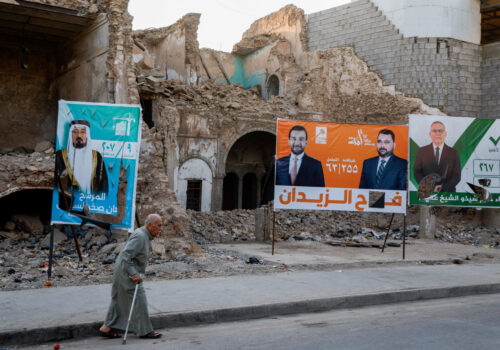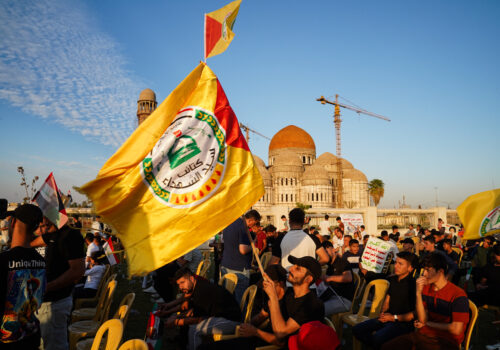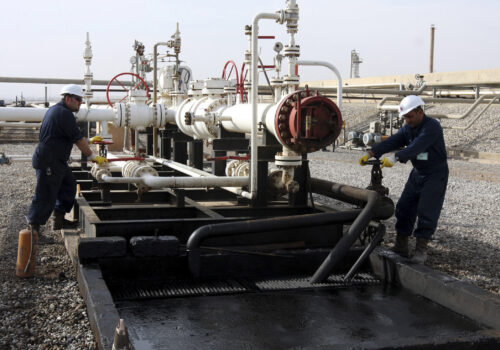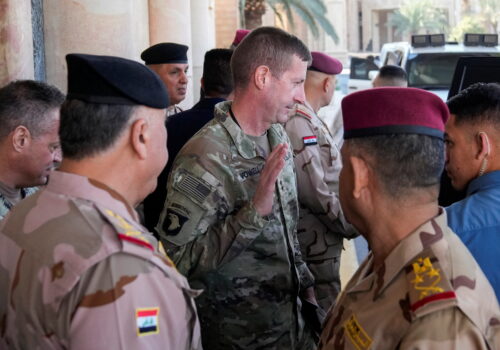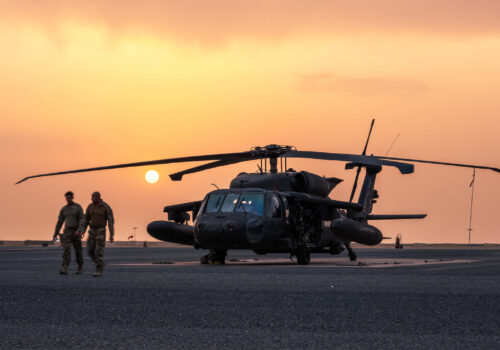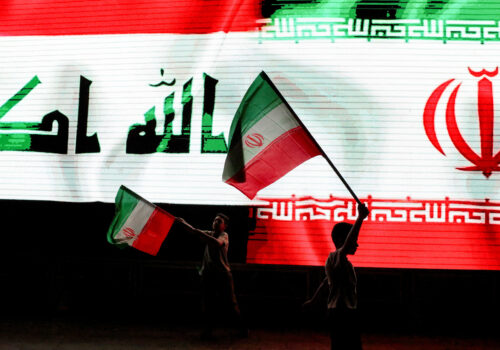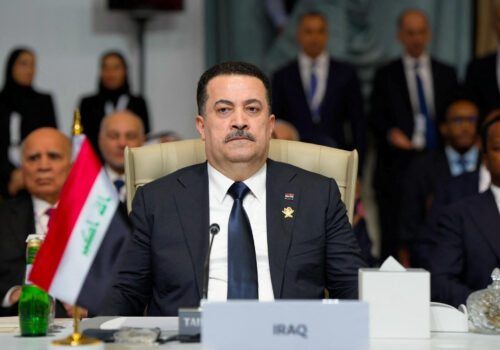Twelve questions (and expert answers) on the Iraq elections
Iraqis are set to go to the polls for parliamentary elections on November 11—the sixth election cycle since the overthrow of Saddam Hussein and Baathist rule in 2003.
There are thousands of candidates running for 329 seats in parliament, at a consequential moment for the country. Iraqis face questions whose answers will shape governance in Baghdad and Erbil, the development of Iraq’s crucial energy sector and economy, and Iraqi security and sovereignty—all as the country continues to balance its relationships with the United States and Iran.
Our experts unpack all of this ahead of the landmark election.
1. What are the key issues for Iraqi voters, and what’s at stake this election cycle?
The Iraqi voter continues to cast their ballot primarily along sectarian and ethnic lines, with few instances of voters supporting candidates outside their own group. This persistent pattern highlights the enduring influence of sectarian and ethnic identity in shaping electoral behavior and political preferences inside Iraq.
Beyond identity-based voting, policy priorities vary significantly across Iraq’s provinces. According to a public opinion survey conducted by the Rewaq Baghdad Center for Public Policy, a center I founded and now lead, electricity was not among the top concerns for voters in the Kurdistan Region and Basra, while it remained a central issue in other provinces. In these areas, voters prioritized essential services such as infrastructure (roads and bridges), education, and healthcare.
These differences in priorities have influenced voter orientation. In provinces such as Wasit, Karbala, and Basra, many voters favored governor-affiliated political blocs, perceiving that local administrations had provided substantial services. Notably, the governor of Karbala is affiliated with Prime Minister Mohammed Shia al-Sudani’s coalition, which may enhance the coalition’s standing in that province.
Overall, it is projected that al-Sudani’s coalition could secure approximately sixty parliamentary seats, contingent on the extent to which he convinces voters that his government has effectively delivered public services during his tenure. In Baghdad, Shia political blocs are expected to lose around five seats, largely due to lower Shia voter turnout and a corresponding increase in Sunni voter participation.
—Abbas Anbori is the founder and president of the Baghdad Rewaq Center for Public Policy, based in Iraq. He began his professional career as the head of international relations at the Iraqi Council of Representatives. Since 2014, he has been serving as a political advisor to the Foreign Relations Committee of the Council.
The Iraqi parliament, at a glance: 2018 versus 2021
2. How likely is it that al-Sudani will return for a second term?
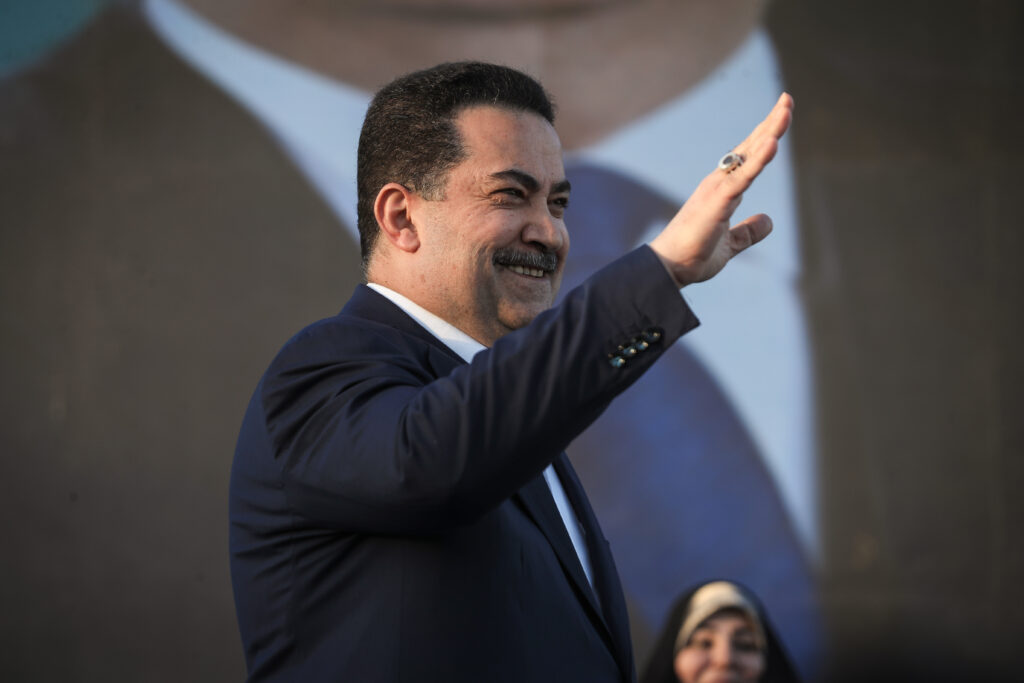
The likelihood of al-Sudani securing a second term appears highly unlikely, primarily due to the deep divisions within the Coordination Framework (CF)—the Shia political coalition that initially selected him for the premiership. Tensions among its constituent blocs have escalated significantly both in the pre-election period and during the campaigns, making consensus around his reappointment difficult to achieve.
While the CF remains the most influential factor in determining al-Sudani’s political future, it is not the only one. Two additional variables play an important role in shaping the post-election government formation process:
One is the international factor, particularly the positions of Iran and the United States, whose tacit approval—or at least lack of objection—often shapes the boundaries of acceptable political outcomes in Iraq.
The second is the role of the city of Najaf’s religious authority (the Marja‘iyya), which has historically exerted significant moral and political influence. However, it is unlikely that Najaf will play a decisive role in the selection process this time. That’s because its religious leadership’s approach this time has been to minimize involvement in political affairs to the lowest possible level.
The only plausible path for al-Sudani to retain the premiership would be if he and his Sunni and Kurdish allies managed to secure a two-thirds majority of parliamentary seats. This scenario appears highly improbable under current political conditions.
—Abbas Anbori
3. What is the Coordination Framework, and how has it impacted the trajectory of the government formation process?
The Coordination Framework (CF) is Iraq’s principal Shia political bloc, originally formed by Islamist parties seeking to counter Moqtada al-Sadr’s coalition, after Iraq’s disputed 2021 parliamentary elections. The CF has since become the leading power broker in Baghdad, responsible for installing al-Sudani as prime minister in 2022, and it dominates the State Administration Coalition that governs Iraq today. The CF this cycle has adopted a controlled fragmentation strategy: multiple lists to maximize votes under Iraq’s new electoral law, followed by a likely post-election reunification to choose the prime minister and divide cabinet posts. The maneuver reflects deep internal rivalries, yet enduring necessity—the Shia parties know they will have a plurality in parliament, and no government can be formed without them.
—Sajad Jiyad is an Iraqi political analyst based in Baghdad. He is a fellow at The Century Foundation. His main focus is on public policy and governance in Iraq, and he has published dozens of papers on Iraq. He is the author of God’s Man in Iraq.
Related reading
The CF is behaving as it usually does—competing for Shia votes separately and, post-election, congregating in one parliamentary bloc to maximize its bargaining power. At this stage, it seems to again face a common danger, the prime minister’s electoral list. This list is aiming high this time, seeking a crushing defeat of the CF’s separate lists in the hope of securing a second term for al-Sudani, something that the CF strongly rejects at this stage. If al-Sudani’s list does not secure enough seats to form a governing coalition with the winning Kurdish and Arab-Sunni lists without the CF, we will likely see al-Sudani’s “return to the fold,” allying himself with the CF.
—Akeel Abbas is a DC-based academic and journalist. His research and publications deal with national and religious identities, as well as modernity and democratization in the Middle East.
4. Who is Moqtada al-Sadr, and how will his followers impact the electoral process?
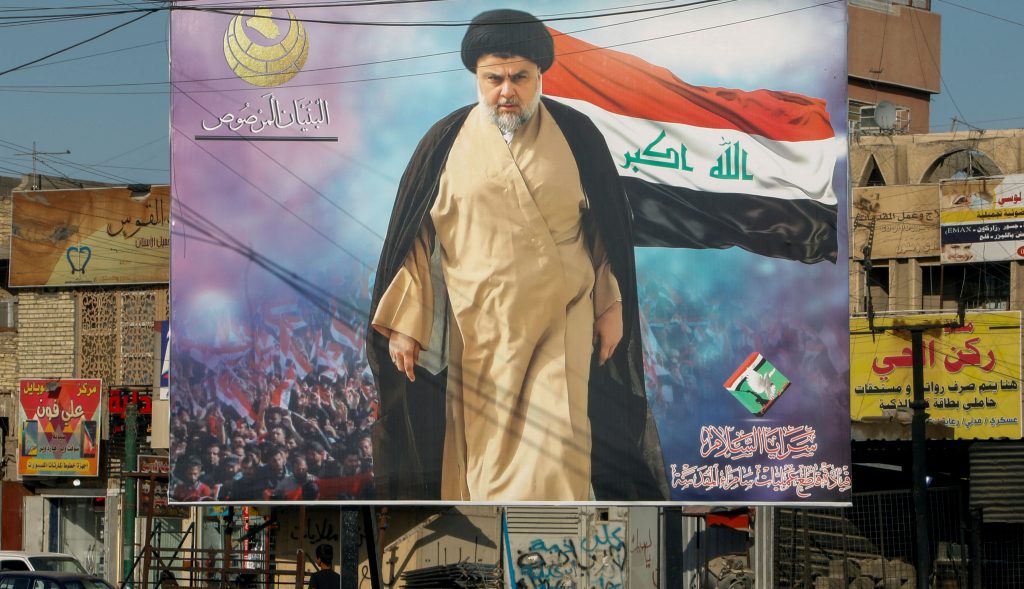
Moqtada al-Sadr is a powerful Iraqi Shia cleric, and his National Shia Movement is likely to exert a profound influence on the elections through its ongoing boycott. Al-Sadr has effectively transformed electoral abstention from an individual act of protest into a collective position adopted across his movement, which remains the most potent mass-mobilizing force in central and southern Iraq.
Unlike in the 2018 and 2021 elections, as well as previous ones, Grand Ayatollah Ali al-Sistani has thus far refrained from issuing a public call urging Iraqis to participate in the forthcoming polls. When prompted to comment this year, Sistani merely stated in a fatwa that voting should be determined “according to the citizen’s own conviction.” This lack of a public call to participate, in contrast to his interventions in previous elections, leaves Sadr’s boycott unchallenged by Najaf’s highest religious authority, thereby weakening the moral counterbalance of Sadrists’ political rivals.
Should Sadr maintain his boycott and Najaf refrain from issuing a statement, the signal to hesitant voters, particularly within the Shia electorate, will be unmistakable: The next parliament and government are likely to suffer from a legitimacy deficit. Such a perception would further erode public confidence in the next government’s capacity to provide stability and welfare amid intensifying financial strain.
—Tamer Badawi is an Iraq-focused analyst and associate fellow at the Royal United Services Institute and the founder and editor of Iraq Nexus, a Substack platform offering in-depth analysis of Iraq’s media and security landscapes.
This is a difficult question because the Sadrists and their leader are unpredictable, and relish in the element of surprise. The primary Sadrist interest in this election is to see the rival CF—who not only deprived them of power but also killed Sadrists during the “Ashura Uprising” of 2022—fail electorally. They may contribute to this outcome by going to the polls, based on potential last-minute orders from al-Sadr or his aides to Sadrist constituencies to vote for the CF’s rivals. Those would mostly be from the liberal-minded al-Badeel and the prime minister’s lists, to ensure that the CF does not secure enough seats to have a credible say in post-election dealmaking.
—Akeel Abbas
5. How are Sunni political blocs positioning themselves, and can they overcome infighting to articulate a unified national agenda?
The main competition among Sunni leaders is shaping up among three key players: former Speaker Mohammed al-Halbousi’s Taqaddum Party, Muthanna al-Samarraie’s Azm Coalition, and Khamis al-Khanjar’s Siyada Coalition. The contest for dominance in representing the Sunni Arab community—with the speakership of parliament as the ultimate prize—has been intense, often involving alliances with non-Sunni groups to gain leverage and outmaneuver Sunni rivals. This rivalry is driven largely by transactional politics and personal ambition rather than ideology or policy differences. As a result, the loyalty of winning members of parliament to their blocs is likely to be tenuous at best. Unlike their Shia counterparts, Iraq’s Sunni politicians lack a powerful external patron capable of moderating competition or curbing personal rivalries that undermine broader communal interests. Indeed, there is little evidence that the leading figures are even interested in developing a unified national agenda—perhaps because the inevitable next question would be this: Who gets to lead it?
—Omar Al-Nidawi is a Middle East analyst focusing on Iraqi political, security, and energy affairs. He is currently the director of programs at the Enabling Peace in Iraq Center.
6. To what extent does Iran shape Iraq’s political landscape?
Iran’s influence on Iraqi politics since 2003 has been a source of concern for many Iraqis, as well as for the United States and other countries in the Middle East.
Iran has been particularly able to shape Shia policies and decision-making. For example, Iran has had a major say in the selection of successive prime ministers and the formation of governments; it has influenced Iraq’s foreign policy—including relations with the United States and Arab countries, and has affected Iraq’s economic decisions, including in the energy sector.
However, this influence has been waning, especially over the past year. Several factors have contributed to the decline. Iran’s June war with Israel and the United States, its devastated economy, and the decimation of Hamas in Gaza and Hezbollah in Lebanon have all weakened Tehran’s ability to wield tools of power. Inside Iraq, several of the Iran-aligned Shia factions now have political and economic interests in the Iraqi state and are therefore less susceptible to Iranian pressure.
While Iran may be less able to dictate operational decisions in Iraq, ideological and political ties remain strong in factions of Iraqi politics, and Iran will continue to exert influence on a broad strategic level.
—Rend Al-Rahim is a nonresident senior fellow with the Iraq Initiative in the Atlantic Council’s Middle East programs. A leading expert on Iraqi politics and civic development, she served as Iraq’s first ambassador to the United States from 2003 to 2005.
Related reading
7. How did last year’s failure to form the Kurdistan Regional Government impact Kurdish interests and electoral strategies in this election?
More than a year after the October 2024 election, the Kurdistan Region still has no new cabinet. The Kurdistan Regional Government’s (KRG) legitimacy, already under scrutiny from Baghdad and international partners, has eroded further.
Several factors converged. Chief among them is the Patriotic Union of Kurdistan’s (PUK’s) refusal to join a government based on its vote or seat share. Instead, the PUK has argued that its territorial control and military weight should shape the cabinet, and the party has sought an empowered deputy prime minister with de facto veto authority. The PUK ran a sharply anti-Kurdish Democratic Party campaign and believes that message energized its base, earning the PUK twenty-three seats. The PUK is likely to have calculated that forming the KRG cabinet before Iraq’s federal elections could blunt that momentum, so it chose to delay, prioritizing partisan gains over institutional legitimacy in hopes of a payoff on November 11.
Related reading
The costs are mounting for the Kurdistan Region. Kurdish leverage in Baghdad is weakening. If the Kurdish Democratic Party performs well and presses a claim to the Iraqi presidency, Erbil’s cabinet talks and federal government formation could become even more complicated. Intra-Kurdish fragmentation not only delays governments in Erbil and Baghdad, but it also undercuts Kurdish national interests. Disunity has already diminished Kurdish bargaining power in post-election coalition talks and eroded the Kurds’ traditional “kingmaker” status. Even when Kurdish parties sit in government, their growing inability to collaborate has hindered progress on core files—the 2019 election law, budget transfers, and implementation of Article 140. Baghdad has exploited these divisions to pare back the region’s autonomy and, with no new cabinet and a sidelined parliament, it’s not inconceivable that Kurdish interests will be further subverted due to the Kurds’ own predicament.
—Yerevan Saeed is a nonresident senior fellow with the Iraq Initiative in the Atlantic Council’s Middle East programs. Saeed is the Barzani scholar-in-residence in the Department of Politics, Governance & Economics at American University’s School of International Service, where he also serves as director of the Global Kurdish Initiative for Peace.
8. Who are the Tishreenis? Have youth protestors given up on the political system?
There is no simple way to define all Iraqis who participated in the Tishreen protests of 2019 to 2020.
The movement was highly diverse—ranging from staunch secularists and communists to loyal followers of Ayatollah Ali al-Sistani, and everything in between. What united them then and continues to drive them today (albeit at a much-reduced level due to the violent response by government forces and militias) is a shared rejection of the corruption, injustice, and national weakness produced by the muhasasa system of ethno-sectarian and partisan power-sharing over the past two decades.
But although Tishreenis broadly share the same goals, they remain divided over how best to achieve them. Some are competing in the upcoming elections through alliances such as al-Badeel, whose members expect their coalition to win up to twenty seats in the 329-member parliament. However, many others remain disillusioned with electoral politics as a viable pathway to reform so long as militias dominate Iraq’s political landscape. Instead, they channel their activism into civil society work, climate action, and entrepreneurship. For those determined to remain in the political arena, such as al-Badeel, the real test will be whether they can avoid the same pitfalls that hampered the Tishreeni lawmakers elected in 2021—namely, weak cohesion and the absence of a clear, coordinated strategy.
—Omar Al-Nidawi
9. Will the independents repeat their impressive performance in the last election?
Barring an electoral surprise, it is unlikely that Iraq’s “independents” will perform as well as they did in 2021. The level of boycott among potential voters who support the independents appears to be higher in this election cycle. However, it is also likely that there will still be a clear, albeit small, representation for the independents in the Council of Representatives this election. The emergence of an electoral list from al-Badeel—a liberal-minded group—seems to be attracting anti-boycott independent voters angry at the CF’s effort to exclude from the race the most independent and anti-militia parliamentary representative, Sajad Salim. The CF’s desire to exclude him has, in fact, given him and his Independence Party much-needed visibility.
—Akeel Abbas
10. How is political violence shaping Iraq’s political environment?
The persistence of targeted assassinations underscores how political silencing in Iraq is reinforced by a pervasive culture of impunity. The recent assassination of Safaa al-Mashhadani, a Sunni electoral candidate and outspoken critic from the crucial Baghdad Belt, has sent shockwaves across Iraq.
Al-Mashhadani’s murder sends a stark warning to disenchanted citizens: Confronting Iraq’s entrenched power structures can carry a fatal price. Beyond fueling political apathy and sectarianism, the assassination affects specific Sunni political parties perceived by CF parties as emerging contenders in Baghdad, particularly at a moment when large segments of Shia voters continue to abstain from the polls.
—Tamer Badawi
11. Will a new government change the direction of Iraqi foreign policy?
A new Iraqi government is unlikely to fundamentally change the direction of Iraq’s foreign policy, but alterations in tone, emphasis, and alignment are probable. Iraq’s strategic posture—balancing between Washington and Tehran while seeking neutrality in regional conflicts—will remain largely intact, though the degree of independence and assertiveness could shift depending on who emerges as prime minister.
—Sajad Jiyad
12. Will the United States have a role in the post-election phase?
There are many reasons for the United States to continue its engagement with Iraq in the post-election phase, given the strategic security, political, and economic interests of both countries in the region and globally.
Related reading
The real question will be how the new prime minister and his government will engage with US President Donald Trump’s administration—including the newly appointed US special envoy to Iraq—to advance the US-Iraq strategic relationship, attract US and foreign investment in Iraq’s development, and address ongoing differences between Baghdad and Erbil. Washington has long made clear its regional interests to Iraqi leaders, as well as US expectations of Iraq’s role on important issues, including support for counterterrorism, limiting Iranian influence in Iraq and the region, and continued Iraqi support for international sanctions on Iran and terrorists.
The Trump administration will expect the new Iraqi government to make progress on integrating Popular Mobilization Forces (PMF) into existing state institutions and limiting PMF-aligned leaders to control of key ministries. Sustaining a constructive, strategic dialogue between Washington and Baghdad on security, political, and economic issues—no matter how uncomfortable and difficult—holds the best approach for advancing US security interests in Iraq and the region.
—Alina L. Romanowski is a distinguished fellow with the Scowcroft Middle East Security Initiative at the Atlantic Council’s Middle East programs. She most recently served as the US ambassador to Iraq (2022-2024) and Kuwait (2020-2022).
Further reading
Wed, Sep 10, 2025
Ten questions (and expert answers) on Operation Inherent Resolve’s end in Iraq
MENASource By
This new frontier in the US-Iraq relationship leaves many opportunities, challenges and unknowns. Our experts unpack it all.
Mon, Jun 30, 2025
Balancing acts and breaking points: Iraq’s US-Iran dilemma
MENASource By C. Anthony Pfaff
The future of US–Iraq relations is neither as dim as it may first appear, nor as promising as one might hope.
Mon, Oct 6, 2025
Can Iraq and Kuwait transform the Khor Abdullah waterway dispute into a regional diplomacy model?
MENASource By
The dispute underscores the complexities of post-conflict border demarcation— and how legal disputes may multiply into geopolitical ones.
Image: People attend a campaign rally by Iraqi Prime Minister Mohammed Shia' al-Sudani of the Reconstruction and Development Coalition, ahead of the Iraqi parliamentary elections, scheduled to be held on 11 November 2025.
